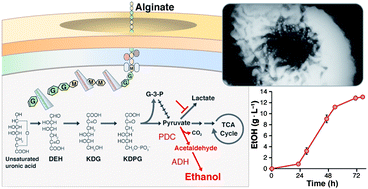Bioethanol production from algae is a promising approach that resolves problems associated with biofuel production from land biomass, such as bioethanol–food conflicts and the indirect land use change. However, it presents several technical difficulties because existing ethanologenic microbes can neither degrade alginate, a major component of brown algae, nor assimilate alginate degradation products. We developed an integrated bacterial system for converting alginate to ethanol using a metabolically modified, alginate-assimilating, pit-forming bacterium, Sphingomonas sp. A1 (strain A1). Overexpression of Zymomonas mobilis pdc and adhB was achieved using a strong constitutive expression promoter newly identified in strain A1 and by inserting multiple gene copies using the methylation sensitivity of XbaI. Metabolome analysis revealed by-product accumulation, and its synthesis pathway was blocked by gene disruption. The ethanologenic recombinant strain A1 accumulated 13.0 g L−1ethanol in 3 d using alginate as the sole carbon source.

You have access to this article
 Please wait while we load your content...
Something went wrong. Try again?
Please wait while we load your content...
Something went wrong. Try again?


 Please wait while we load your content...
Please wait while we load your content...